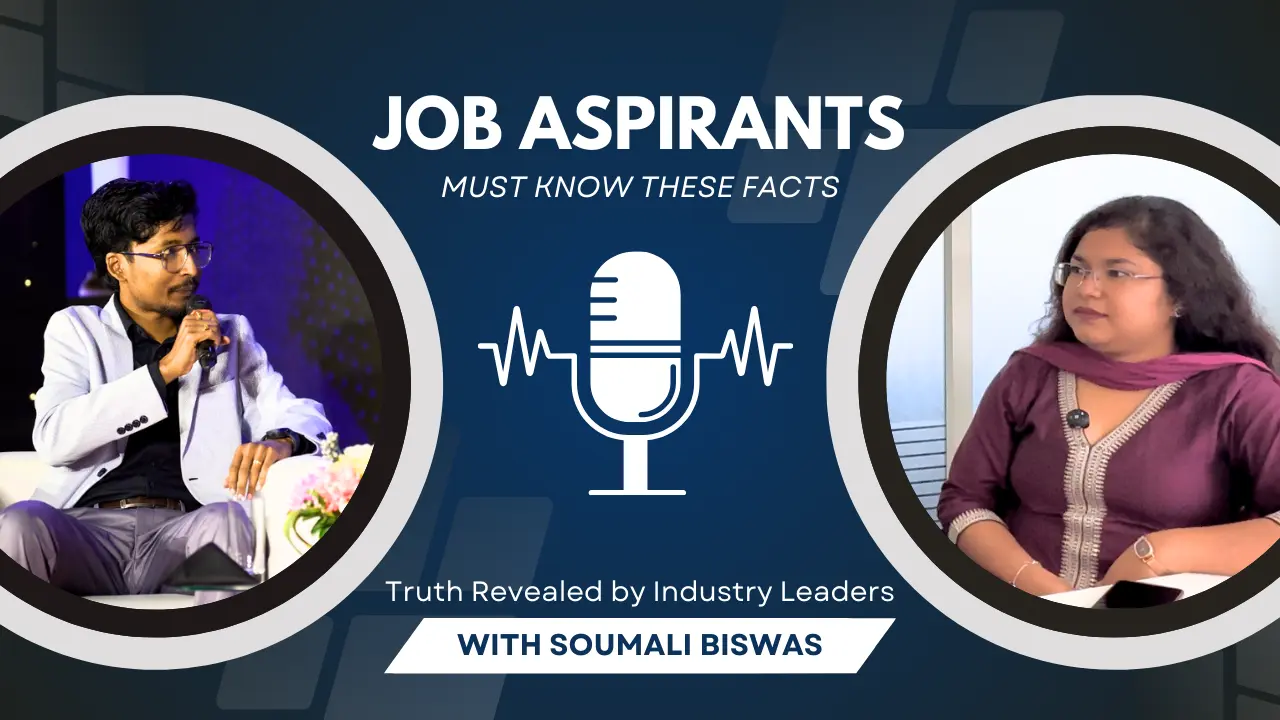
Career Advice Podcast with Insights from an HR Professional
Only getting good grades in engineering school is important, but it isn’t enough to land a great job. Companies are looking for more. They want people who can adapt, have practical skills, and understand how the real world works.
This podcast shares advice from an HR expert who has helped many graduates. She talks about the big gap between what you learn in school and what employers actually need. Most importantly, she explains how you can close that gap.
You will get practical tips on breaking out of your comfort zone, building a strong resume, and finding the right internships. The discussion also covers how family can influence your career path and the differences between private sector and government jobs.
If you are an engineering student thinking about your future, this episode is a helpful guide for your next steps.
The Speaker’s Career Journey: From Uncertainty to HR Leadership

HR Manager Soumali Biswas
Like many students, she started her career feeling unsure. Her father, who had an MBA degree in finance, initially wanted her to become a financial analyst. She felt torn between his hopes and her own interests.
Everything changed when she took some classes in communication and soft skills. These workshops showed her a new path. She discovered she was good at connecting with people and handling different situations. This led her to a career in human resources.
She built her experience by taking on internships and other hands-on roles. She managed a digital marketing team, worked with clients, and even led IT projects. This work was not part of her formal training. It pushed her out of her comfort zone, but it taught her to adapt and solve problems. These are the skills employers want most.
Breaking Out of the Comfort Zone

Staying in your comfort zone can hurt your career growth. That was a key point from our speaker. She explained that while comfort zones feel safe, they stop you from growing.
She used a cricket example. A batter who only faces easy bowling never improves. To get better, they need to face the fastest, toughest pitchers.
The same is true for engineers. You must push yourself. Try hard projects. Learn skills outside your major. Step into roles you don’t feel ready for.
Your comfort zone is for your free time, not your career.
For instance:
- A CS student who only uses familiar code languages won’t learn new ones that companies want.
- A mechanical student who avoids tough internships misses the chance to gain real skills.
Growth feels uncomfortable. But that feeling is how you know you’re moving forward.
The Resume Dilemma: Academic CVs vs. Corporate Expectations
Your resume is your first hello to a company. Many students get this wrong. They send in long, academic-style resumes that list everything. But hiring managers are busy. They want a short, clear resume that fits the job.
An HR expert points out common errors:
- Resumes that are way too long, like 10 pages.
- Using the same resume for every single job.
- Adding every small award instead of what matters for the role.
She says to make a resume that companies want to see.
- Keep it to one or two pages.
- Highlight skills and experiences that match the job description.
- Use keywords relevant to the role (for ATS systems).
- Show what you achieved. For example, “I built an app that cut down work time by 20%.”
The Employability Gap: Why Many Graduates Struggle

Every year, thousands of new engineers graduate. Yet companies still struggle to find people who are truly ready to work. An HR expert shared a surprising fact. On paper, 62% of graduates seem employable. But in reality, only about 15% are actually prepared for a job.
Why is there such a big gap?
- Wrong Expectations: Many colleges tell students they will get manager jobs right after school. The truth is most start in entry-level roles. These jobs require patience and a willingness to learn from the ground up.
- Fixed Mindset: Some graduates only want to do one specific thing, like coding. They refuse to learn other skills that would make them more useful.
- Paper vs. Practice: A degree or certificate does not mean you have skills. Real skill comes from applying knowledge, not from holding a piece of paper.
This gap is a problem for companies. They have to spend a lot of time and money training new hires. This makes them very picky about who they choose to hire.
Parents and Career Decisions: A Double-Edged Sword
In India, parents often play a big role in choosing their child’s career. They usually push for safe options, like a government job. Parents have good advice from their own lives, but they might not know about today’s new kinds of jobs.
The HR expert had some advice for parents. She said they should learn about the current job market. They can listen to podcasts or go to talks to understand new opportunities. She also urged them not to force old ideas of success on their children.
For students, it’s about balance. You should respect your parents’ wishes, but also follow your own goals. Just doing what your parents say can make you unhappy. But ignoring them completely can lead to fights. The best way is to talk it out, do your own research, and make a smart choice together.
Private Jobs vs. Government Jobs: The Eternal Debate
For decades, the choice between government jobs and private jobs has been a defining dilemma. The podcast broke down both sides clearly:
Government Jobs
- Pros: Job security, fixed salary, social respect, predictable work-life balance.
- Cons: Intense competition, slow growth, limited mobility, bureaucracy.
Private Jobs
- Pros: Faster career growth, skill development, higher salary potential, exposure to new industries.
- Cons: Job insecurity, performance pressure, need to constantly prove oneself.
Ultimately, the choice depends on individual goals. For someone seeking stability, government roles are appealing. For those chasing growth and dynamism, private jobs offer more.
The Power of Internships
Perhaps the most actionable advice from the podcast was to prioritize internships. The speaker urged students to complete at least three internships by their final year, whether paid or unpaid.
Why internships matter:
- Internships give students practical knowledge of industry operations.
- It helps students discover what they enjoy, and what they don’t.
- It makes resumes stronger and more relevant.
- Often, a good internship can even lead to a job offer.
For example, a student may realize during an internship that they dislike coding but enjoy project management. This can save years of misdirected effort.
Investing in Skills and Lifelong Learning

A common mistake is to stop learning once you get a job. But things change fast. If you are not learning, you are falling behind.
The HR expert explained that you must keep investing in your own skills. She suggests using online courses from sites like Coursera, Udemy, or edX. Earning new certifications can also help a lot. Try to go to industry events and webinars. Working on your own projects is a great way to show what you can do.
Companies notice people who take the lead in their own growth. They prefer this over employees who only wait for company training.
Practical Advice: What Students Must Do Now
Based on her experience, she shared clear advice for students:
Don’t wait for the perfect chance. Take any opportunity you get. Every bit of experience helps. Stay open to different roles, even if they weren’t part of your original plan.
Focus on building a strong base. Know the core subjects well. Good communication and coding basics are more important than extra certificates.
You must do internships. Try to complete at least three before you graduate.
Value your parents’ advice, but make your own choices after you do your research. Think carefully about whether a private company or a government job is a better fit for your own goals.
Never stop learning. Always work on improving both your technical and soft skills.
Conclusion
This podcast episode served as a powerful reminder that career development is a journey of choices, challenges, and continuous growth. The HR professional’s story reflects the struggles, doubts, and breakthroughs that many students face. Her insights make one thing clear: academic success alone doesn’t guarantee corporate success.
Students must step out of their comfort zones, build corporate-ready resumes, gain practical exposure through internships, and never stop learning. Parents must evolve with the changing job market to provide informed guidance. And students must remember that careers are built on adaptability and self-investment, not just degrees.
Ultimately, the responsibility lies with each student. The path may be uncertain, but with the right mindset and preparation, success is achievable.









